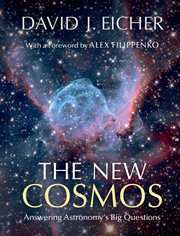Book contents
- Frontmatter
- Dedication
- Contents
- Foreword
- Preface
- Acknowledgments
- 1 The awakening of astronomy
- 2 How the Sun will die
- 3 The end of life on Earth
- 4 How the Moon formed
- 5 Where has all the water gone?
- 6 Why did Venus turn inside-out?
- 7 Is Pluto a planet?
- 8 Planets everywhere…
- 9 The Milky Way as barred spiral
- 10 Here comes Milkomeda
- 11 The Big Bang's cosmic echo
- 12 How large is the universe?
- 13 The mystery of dark matter
- 14 The bigger mystery of dark energy
- 15 Black holes are ubiquitous
- 16 What is the universe's fate?
- 17 The meaning of life in the universe
- Glossary
- Bibliography
- Index
7 - Is Pluto a planet?
Published online by Cambridge University Press: 05 December 2015
- Frontmatter
- Dedication
- Contents
- Foreword
- Preface
- Acknowledgments
- 1 The awakening of astronomy
- 2 How the Sun will die
- 3 The end of life on Earth
- 4 How the Moon formed
- 5 Where has all the water gone?
- 6 Why did Venus turn inside-out?
- 7 Is Pluto a planet?
- 8 Planets everywhere…
- 9 The Milky Way as barred spiral
- 10 Here comes Milkomeda
- 11 The Big Bang's cosmic echo
- 12 How large is the universe?
- 13 The mystery of dark matter
- 14 The bigger mystery of dark energy
- 15 Black holes are ubiquitous
- 16 What is the universe's fate?
- 17 The meaning of life in the universe
- Glossary
- Bibliography
- Index
Summary
Pluto has evoked emotions among astronomy enthusiasts and the general public at large as much as any other astronomical object. This was certainly the case in the early 1930s, following its discovery by farm boy turned astronomer Clyde W. Tombaugh (1906–1997), and its naming after the Greek god of the underworld. The public's embrace of the strange new world seemed to accelerate after Walt Disney created a canine character friend of the cartoon character Mickey Mouse and named the dog Pluto, apparently inspired by the new planet. Certainly, the dramatic story of the discovery of Pluto, by a 23-year-old from Kansas, swelled American pride in the ability of a young kid to make an astonishingly unlikely discovery against the odds through simple persistence and dogged determination.
The emotions over Pluto from the 1930s, however, paled compared with the emotions that followed a controversial decision in 2006. In that year, the International Astronomical Union (IAU), the official organization of astronomers charged with naming and defining cosmic bodies, “demoted” Pluto. For 76 years, Pluto was known to one and all as the ninth planet of the solar system. In 2006, the IAU reclassified Pluto as a dwarf planet, a new categorization, after the realization of some years that many icy bodies exist in the Kuiper Belt, the disk of enormous numbers of small and medium-sized bodies in the region of Neptune and Pluto. Such bodies had been discovered starting in 1977, with the asteroid 2060 Chiron, and many icy asteroids with eccentric orbits were uncovered in the following years, particularly in the 1990s. Astronomers realized they would ultimately find enormous numbers of icy asteroids in the Kuiper Belt, some speculating about tens of thousands, and feared that Pluto was just the most well known of a vast new class of objects.
At a meeting in Prague, a small fraction of the members of the IAU voted on redefining just what constitutes a planet. The IAU produced three major criteria for defining a planet: (1) a planet orbits the Sun; (2) it is massive enough to exist in hydrostatic equilibrium – that is, it is spherical ‒ and (3) it has “cleared the neighborhood” of smaller bodies within its orbit.
- Type
- Chapter
- Information
- The New CosmosAnswering Astronomy's Big Questions, pp. 89 - 102Publisher: Cambridge University PressPrint publication year: 2015



